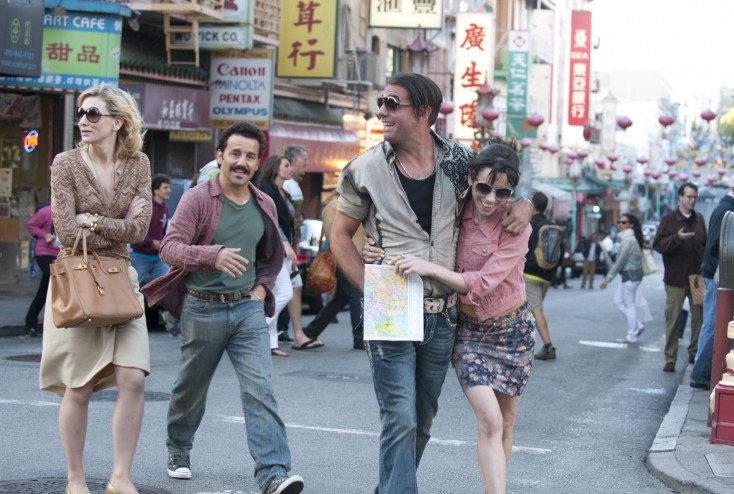
Left to right: Cate Blanchett as Jasmine, Alec Baldwin as Hal, Andrew Dice Clay as Augie and Sally Hawkins as Ginger in “Blue Jasmine.” © 2013 Gravier Productions CR: Jessica Miglio.
By JAMES DAWSON
Front Row Features Film Critic
As the irritatingly snobbish but ultimately pathetic widow of a cheating corporate crook, Cate Blanchett actually manages to raise some sympathy for a New Depression devil in director-writer Woody Allen’s “Blue Jasmine.”
This odd little dramedy doesn’t include a role for the Woodman himself, and there’s no Woody stand-in delivering his trademark neurotic one-liners. That doesn’t mean “Blue Jasmine” is a return to Allen’s grimly joyless “Interiors” or “Another Woman” period, however. The tone here is winking enough to make Blanchett’s in-denial Jasmine seem outrageously obnoxious as well as unexpectedly tragic.
Blanchett is in nearly every scene as a self-obsessed former one-percenter brought low by scandal. Although clearly inspired by the real world’s Mrs. Bernie Madoff, Jasmine has retained no trappings of wealth besides her Louis Vuitton luggage. We meet her as she arrives broke at her very blue-collar sister’s San Francisco apartment to move in.
While it’s interesting to see Allen’s take on what life among the lowly is like, a few things besides his idea of how much living space a single grocery clerk with two kids can afford seem very off. In order to take an online interior decorating course that realistically would not require any in-depth programming or software knowledge, Jasmine finds it necessary to enroll in a computer class that meets regularly and overwhelms her with study homework. She later forms a deceptive relationship with a wealthy and seemingly intelligent State Department employee (Peter Sarsgaard) who hopes to be an ambassador and/or congressman, yet who is so unrealistically incurious that he never bothers Googling Jasmine to learn more about her past.
That relationship also has the unfortunate effect of turning this downward-spiral character study into a less satisfying “waiting for things to hit the fan” story. Jasmine’s travails are more interesting when they consist of random acts of degradation: listening to her sister’s crude friends talk about bad clams, getting molested by a horny boss and being reminded by random comments of how very far she has fallen from her former fabulousness.
She also recalls in flashbacks that things weren’t completely perfect even in her Martha’s Vineyard and Park Avenue period. Husband Hal (Alec Baldwin, essentially playing a less absurd business tycoon version of his “30 Rock” Jack Donaghy character) is a smooth-talking serial philanderer. Although blithely unconcerned about adding her name to Hal’s business ventures, Jasmine admits she would have to have been an idiot not to realize their gains were ill-gotten.
Those mask-dropping moments of reflection, when Jasmine displays the hopeless defeat that comes with acknowledging she’s now poor in a country that puts such a high value on wealth, are the movie’s truest moments. “There’s only so many traumas a person can withstand,” she says, explaining a breakdown. By that time, it’s hard not to empathize at least a little with even such an otherwise unsympathetic let-them-eat-caker.
The Shelley Duvall-like Sally Hawkins is too cheerfully one-notish as Jasmine’s forgivingly enabling sister Ginger, whose bad romance choices include bitter ex-husband Augie (a toned-down but not entirely convincing Andrew Dice Clay), loudly crass boyfriend Chili (a scenery-chewing Bobby Cannavale) and impetuous fling Al (Louis C.K., who seems to be winging his three scenes).
It’s a relief that the movie doesn’t try getting away with a condescending moral about reduced circumstances making Jasmine a better or more well-adjusted person. Even with its flaws, Jasmine’s former designer-decorated life of indulgence clearly is preferable to the “it’s too menial!” middle-class existence she abhors. As Sophie Tucker once said, “I’ve been rich and I’ve been poor. Rich is better.”




